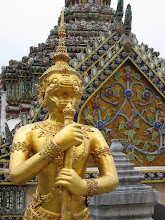Sunday, August 18, 2013
Mahayana Mahaparinibana Sutra
Mahayana Mahaparinibana Sutra
Vamsapala
5301201125
The Nirvana Sutra
evidently has some importance for any discussion of the Tathāgatagarbha and
Buddha-nature (buddha-dhātu) doctrines.
The full seeing of the
Buddha-nature ushers in Liberation from all suffering, and effects final
deliverance into the realm of Great Nirvana (maha-nirvana). This "True
Self" or "Great Self" of the nirvanic realm is said to be
sovereign, to be attained on the morning of Buddhahhood, and to pervade all places
like space.
Compare with lotus
sutra , I have to say this similarities between these two sturas because both
of then talking about the end of life and suffering however the more clear
reason in lotus sutra presents itself as a discourse delivered by the Buddha
toward the end of his life. The ultimate teaching of the sutra is implied to
the reader that "full Buddhahood"
is only arrived at by exposure to the truths expressed implicitly in the Lotus
Sutra
Srimaladevi sutra
Srimaladevi
sutra
Vamsapala :
5301201125
This srimaladevi sutra is The
Lion's Roar of Queen Srimala Discourse A Buddhist Scripture on the
Tathagatagarbha Theory . In
the Srimala Devi Sutra the Tathagata-garbha is explained in terms of Emptiness;
empty of defilements, but not ultimately empty, because it still possess the
Buddha dharmas which are said to be nondiscrete and inconceivable.
Mahāprajñāpāramitā sutra
Mahāprajñāpāramitā sutra
Vamsapala 5301201125
Mahāprajñāpāramitā sutra also known as heart sutra, Its
Sanskrit name Prajñāpāramitā Hṛdaya literally
means The Heart of the Perfection of
Transcendent Wisdom. It means the Perfection of
(Transcendent) Wisdom. The word Prajñāpāramitā combines the Sanskrit
words prajñā (wisdom) with pāramitā
(perfection). Prajñāpāramitā is a central concept in Mahāyāna Buddhism and its practice and
understanding are taken to be indispensable elements of the Bodhisattva Path.
Dasabhumika Sūtra
Dasabhumika
Sūtra
Vamsapala
: 5301201125
Dasabhumika known
as The Ten Stages Sutra is an early, influential Mahayana
Buddhist
scripture. The sutra also appears as the 26th chapter of the Avataṃsaka Sūtra.In the Daśabhūmika Sūtra, the
Buddha describes ten stages of
development
that a bodhisattva must progress through in order to
accomplish full Enlightenment and Buddhahood, as well as the subject of Buddha-nature and the awakening of the aspiration for Enlightenment.
Contemporary world Buddhism in India ( Link download PDF
https://docs.google.com/file/d/0BybPA80Ro9kHUFRRa1VINEhzSzg/edit?usp=sharingContemporary world Buddhism in India ( Link download PDF
JAINISM
JAINISM
Vamsapala: 5301201125
HINDUSIM (Brief )
1.
HINDUSIM (Brief )
 Hinduism
is perhaps the oldest religions of the world. According to Veda scripture ,
Hinduism is more like a tree that has
grown gradually than like a building that has been erected by some great
architect at some definite point in time. It contains within itself the
influences of many cultures and the body of Hindu thought thus offers as much
variety as the indian nation itself.
Hinduism
is perhaps the oldest religions of the world. According to Veda scripture ,
Hinduism is more like a tree that has
grown gradually than like a building that has been erected by some great
architect at some definite point in time. It contains within itself the
influences of many cultures and the body of Hindu thought thus offers as much
variety as the indian nation itself. Buddhism
Buddhism
Vamsapala
5301201125
Buddhism
is indisputably a separate religion and philosophy, which has excreted immense
influence over the religious and philosophical thinking of the world. Buddhism
has a definite origin in a definite founder , Gotama who was born in a royal
hindu family. Buddhism is thus, at least in its original form, a practical
religion of pure ethical discipline, it does not believe in any god and
therefore no ritualistic acts find any place in it. Although Buddhism does not believe in any god
until later on Buddha himself was begun to be venerated like god Buddhists form
the very beginning have entertained and shown a sence of veneration towards
Buddha as a teacher.










 9:34 AM
9:34 AM
 mr.vam
mr.vam

 Translate
Translate